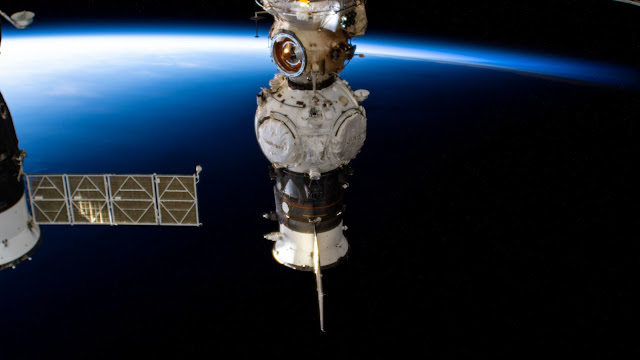ISS - Expedition 66 Mission patch.
Dec 28, 2021
The Expedition 66 crew members continue unpacking the SpaceX Cargo Dragon vehicle and initiating brand new microgravity investigations. Some of the new science taking place aboard the International Space Station today is looking at plant genetics, human cellular function, and even space laundry techniques.
The four NASA astronauts living on the orbital lab took turns on Tuesday offloading some of the 6,500 pounds of new crew supplies, station hardware, and science experiments. Flight Engineer Kayla Barron began her morning working inside the Cargo Dragon. She then serviced samples inside the Electrostatic Levitation Furnace, a research device that observes the thermophysical properties of high temperature materials.
Image above: The Prichal, pictured still attached to the Progress delivery vehicle, is docked to the Nauka multipurpose laboratory module as the station orbited into a sunrise. Image Credits: ROSCOSMOS/NASA.
Astronauts Mark Vande Hei, Thomas Marshburn and Raja Chari got together on Tuesday afternoon to unpack the Cargo Dragon as well. Vande Hei and Marshburn have also begun work on a pair of new experiments exploring how to improve life in space. Vande Hei is testing detergent samples to learn how to keep clothes clean in a variety of gravity environments during long-term space missions. Marshburn set up the Veggie botany research facility for observing plant growth at the genetic level to promote space agriculture. Chari collected and spun his blood samples in a centrifuge then stowed them for later analysis. Afterward, Chari entered the Columbus laboratory module and began organizing cargo packed inside.
Flight Engineer Matthias Maurer of ESA (European Space Agency) collected research hardware from inside Columbus for a space biology investigation. He then began assembling that gear and thawing culture chambers inside the Kibo laboratory module. The work is for the new Cytoskeleton biology study, taking place in the Life Science Glovebox, and will explore how the machinery of the human cell is impacted by weightlessness.
ISS HD Live/Orbiter.ch Aerospace
Cosmonauts Anton Shkaplerov and Pyotr Dubrov, along with Vande Hei, started their day practicing emergency evacuation procedures. The trio trained on a computer for the procedures they would use in the unlikely event they would have to quickly board the Soyuz MS-19 crew ship, undock and return to Earth. Shkaplerov then unpacked Russian spacewalk gear delivered recently aboard the Prichal docking module. Dubrov focused on electronics and hardware maintenance for the rest of the day.
Related links:
Expedition 66: https://www.nasa.gov/mission_pages/station/expeditions/expedition66/index.html
Electrostatic Levitation Furnace: https://www.nasa.gov/mission_pages/station/research/experiments/explorer/Facility.html?#id=1536
Testing detergent samples: https://www.nasa.gov/mission_pages/station/research/experiments/explorer/Investigation.html?#id=8595
Veggie: https://www.nasa.gov/mission_pages/station/research/experiments/explorer/Facility.html?#id=374
Plant growth at the genetic level: https://www.nasa.gov/mission_pages/station/research/experiments/explorer/Investigation.html?#id=8299
Columbus laboratory module: https://www.nasa.gov/mission_pages/station/structure/elements/europe-columbus-laboratory
Kibo laboratory module: https://www.nasa.gov/mission_pages/station/structure/elements/japan-kibo-laboratory
Cytoskeleton: https://www.nasa.gov/mission_pages/station/research/experiments/explorer/Investigation.html?#id=1702
Life Science Glovebox: https://www.nasa.gov/mission_pages/station/research/experiments/explorer/Facility.html?#id=7676
Prichal docking module: https://go.nasa.gov/3cOCFx6
Space Station Research and Technology: https://www.nasa.gov/mission_pages/station/research/overview.html
International Space Station (ISS): https://www.nasa.gov/mission_pages/station/main/index.html
Image (mentioned), Animation (mentioned9, Text, Credits: NASA/Mark Garcia.
Greetings, Orbiter.ch



